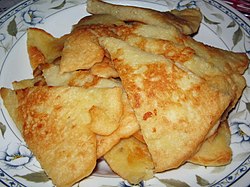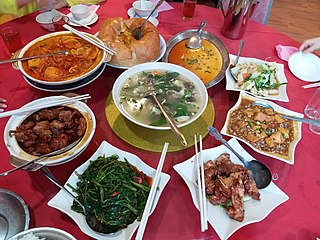
Malaysian cuisine consists of cooking traditions and practices found in Malaysia, and reflects the multi-ethnic makeup of its population. The vast majority of Malaysia's population can roughly be divided among three major ethnic groups: Malays, Chinese and Indians. The remainder consists of the indigenous peoples of Sabah and Sarawak in Malaysian Borneo, the Orang Asli of Peninsular Malaysia, the Peranakan and Eurasian creole communities, as well as a significant number of foreign workers and expatriates.

Nasi lemak is a Malay cuisine dish originated from Malaysia that consists of fragrant rice cooked in coconut milk and pandan leaf. It is commonly found in Malaysia, where it is considered the national dish. It is also the native dish in neighbouring areas with significant Malay populations such as Singapore, Brunei, and Southern Thailand. In Indonesia it can be found in several parts of Sumatra; especially the Malay regions of Riau, Riau Islands and Medan. Nasi lemak can also be found in the Bangsamoro region of Mindanao, prepared by Filipino Moros, as well as Australia's external territories of Christmas Island and the Cocos (Keeling) Islands. It is considered an essential dish for a typical Malay-style breakfast.

Laksa is a spicy noodle dish popular in Southeast Asia. Laksa consists of various types of noodles, most commonly thick rice noodles, with toppings such as chicken, prawn or fish. Most variations of laksa are prepared with a rich and spicy coconut soup or a broth seasoned with sour asam.

Malay cuisine is the traditional food of the ethnic Malays of Southeast Asia, residing in modern-day Malaysia, Indonesia, Singapore, Brunei, Southern Thailand and the Philippines as well as Cocos Islands, Christmas Island, Sri Lanka and South Africa.

Tempoyak, asam durian or pekasam is a Malay condiment made from fermented durian. It is usually consumed by the ethnic Malays in Maritime Southeast Asia, notably in Indonesia and Malaysia. Tempoyak is made by taking the flesh of durian and mixing it with some salt and kept in room temperature for three or five days for fermentation. Tempoyaks are usually made during the durian season, when the abundance of durian and excess production are made into fermented tempoyak.

Lekor, keropok lekor or fish sausage is a traditional Malay fish cracker snack originating from the state of Terengganu, Malaysia. It is made from fish and sago flour and seasoned with salt and sugar. It is slightly greyish in colour and gives off a fishy taste and smell which becomes more prominent as it cools down after frying. The word lekor is said to be derived from a Terengganu Malay word meaning "to roll".
The city of Ipoh is the administrative capital of the Malaysian state of Perak and is famous for its cuisine. Its food culture is driven by its majority Chinese population who are largely of Cantonese and Hakka descent. There is also excellent Malay and Indian food in Ipoh; the nasi kandar served by a prominent local Mamak stall is nicknamed nasi ganja due to its supposed addictive properties. Specialty foods from neighbouring towns are also available in Ipoh.

Peranakan cuisine or Nyonya cuisine comes from the Peranakans, descendants of early Chinese migrants who settled in Penang, Malacca, Singapore and Indonesia, inter-marrying with local Malays. In Baba Malay, a female Peranakan is known as a nonya, and a male Peranakan is known as a baba. The cuisine combines Chinese, Malay, Javanese, South Indian, and other influences.

Budu is an anchovies sauce and one of the best known fermented seafood products in Kelantan, Terengganu in Malaysia, southern Thailand and Natuna islands in Indonesia and South Sumatra, Bangka island and Western Kalimantan of Indonesia. It is mentioned in A Grammar and Dictionary of the Malay language, With a Preliminary Dissertation, Volume 2, By John Crawfurd, published in 1852.

Peter Pek is a Malaysian businessman, and the chief executive of the World Branding Forum, a global non-profit organisation that manages and supports a range of programmes. He is also the executive producer of the World Branding Awards. He is the former creative director of New Nation, a British tabloid; the editor-in-chief of Food & Beverage magazine; and publisher of Malaysian Superbrands;. He was a host and judge of the corporate reality television series The Firm. He also starred in The Firm with Chan Boon Yong. The second season of the hit show premièred on 2 August 2008. Peter died on 21st November 2018.

Nasi dagang is a Malaysian dish consisting of rice steamed in coconut milk, fish curry and extra ingredients such as pickled cucumber and carrots.
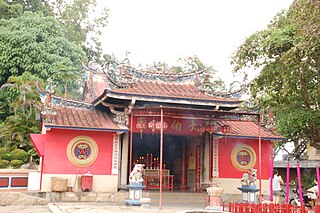
Tua Pek Kong. lit. "grand uncle") is one of the pantheon of Malaysian, Indonesian and Singaporean folk religions. Throughout Southeast Asia, Tua Pek Kong is referred as the "God of Prosperity", where he is thought to be an incarnation of the god "Fu" from the trio of "Fu Lu Shou" representing "Prosperity, Fortune and Longevity" or a sailor from Fujian who sacrificed himself for a fellow human.

David Nga Kor Ming, is a Malaysian politician who served as Deputy Speaker of the Dewan Rakyat under former Speaker Mohamad Ariff Md Yusof from July 2018 to his resignation in July 2020 and Member of the Perak State Executive Council (EXCO) in the Pakatan Rakyat (PR) state administration under former Menteri Besar Mohammad Nizar Jamaluddin briefly from March 2008 to the collapse of the PR state administration in February 2009. He has served as the Member of Parliament (MP) for Teluk Intan since May 2018 and Taiping from March 2008 to May 2018, Member of the Perak State Legislative Assembly (MLA) for Aulong since May 2018, Kepayang from May 2013 to May 2018 and Pantai Remis from November 1999 to March 2013. He is a member, Deputy Secretary-General and State Chairman of Perak of the Democratic Action Party (DAP), a component party of the Pakatan Harapan (PH) federal opposition coalition.

Papeda, or bubur sagu, is a congee made from sago starch that is a staple food of the indigenous people in eastern Indonesia, namely parts of Sulawesi, Maluku Islands and Papua. It is also widespread in Papua New Guinea and serves as a counterpart of central and western Indonesian cuisines that favour rice as their staple food.

Roti jala, roti kirai or roti renjis is a popular Malay and Minangkabau tea time snack served with curry dishes which can be found in Indonesia, Malaysia and Singapore. The roti jala is a pretty dish that looks like a lace doily due to the way it is made. This is a very traditional Malay dish that is usually homemade and served at events such as weddings and festivals. It is usually eaten in sets of three to four pieces with curries, especially chicken curry, as a substitute to rice.

Asam pedas is a Maritime Southeast Asian sour and spicy fish stew dish. Asam pedas is believed to come from Minangkabau cuisine of West Sumatra, Indonesia and has spread throughout to the islands of Sumatra, Borneo and Malay Peninsula.
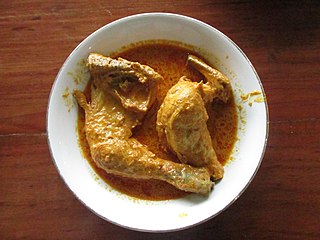
Gulai is a type of food containing rich, spicy and succulent curry-like sauce commonly found in Indonesia, Malaysia and Singapore. The main ingredients of this dish are usually poultry, goat meat, beef, mutton, various kinds of offal, fish and seafood, as well as vegetables such as cassava leaves, unripe jackfruit and banana stem.
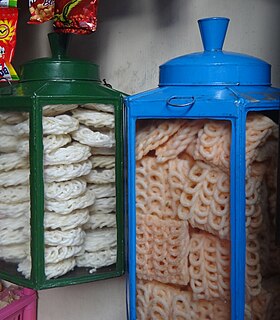
Krupuk (Javanese), kerupuk (Indonesian), keropok (Malay), kroepoek (Dutch) or kropek (Tagalog) is a cracker made from starch or animal skin and other ingredients that serve as flavouring. Most krupuk are deep fried, while some others are grilled or hot sand fried. They are a popular snack in maritime Southeast Asia, and is most closely associated with the culinary traditions of Indonesia, in particular Javanese cuisine. It is an ubiquitous staple in its country of origin, and later spread to other countries either via the migration of diaspora populations or exports.
Tengku Zulpuri Shah bin Raja Puji is a Malaysian politician who was Deputy Minister of Water, Land and Natural Resources in the Pakatan Harapan (PH) administration under former Prime Minister Mahathir Mohamad and former Minister Xavier Jayakumar Arulanandam from July 2018 to the collapse of the PH administration in February 2020. He has been the member for Raub since May 2018. He was Leader of the Opposition of Pahang and Member of the Pahang State Legislative Assembly (MLA) for Mentakab from May 2013 to May 2018. He was also a member of the Selayang Municipal Council (MPS). He is a member, National vice-chairman, deputy chair of Pahang and sole Malay MP of the Democratic Action Party (DAP), a component party of the PH opposition coalition. He is also a member of the Pahang royal family and son of Tengku Puji Tengku Abdul Hamid, former Deputy Commissioner of Pahang and former committee member of the Malaysian Islamic Party (PAS).

Pekasam, Pakasam or Bekasam is a Malay term for fermented food, more precisely fermented fish product. In Malay and Banjar cookery, pekasam usually refers to freshwater fish fermented with salt, palm sugar, toasted rice grains and pieces of asam gelugur.
